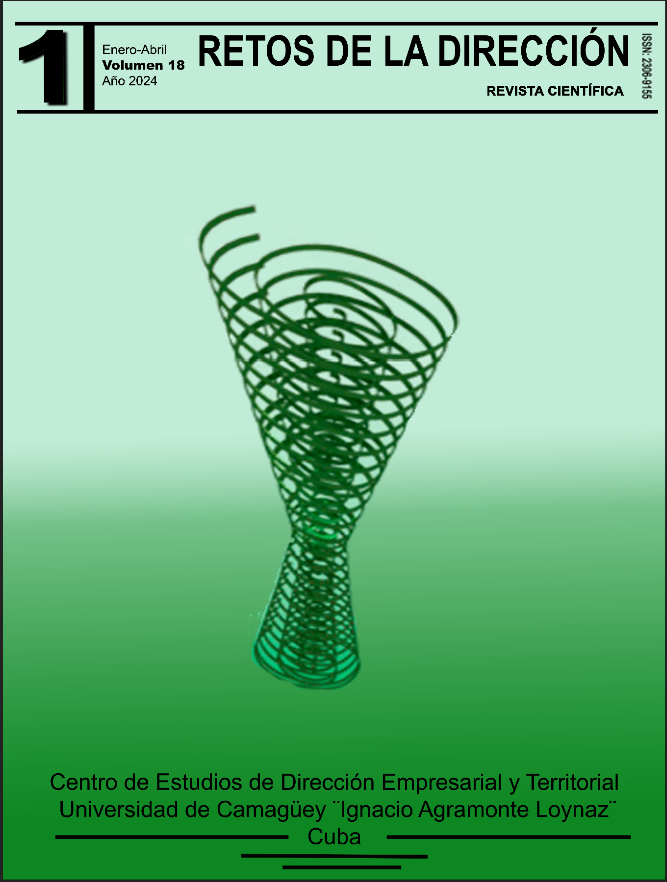Reciprocal influence between corporate social responsibility and brand value in Peruvian restaurants
Keywords:
corporate social responsibility, brand value, restaurants, tourist restaurantsAbstract
Objective: to describe the reciprocal influences that occur between the evaluation that customers make of the CSR of restaurants in an area of high tourist attraction in Lima, Peru, and the VM that they attribute to those restaurants.
Materials and methods: a descriptive quantitative study was carried out, with a correlational scope and a transversal approach. Data collection was carried out through two surveys, one for corporate social responsibility and one for brand value. The sample was obtained through a stratified random sampling of 417 restaurant customers in an area of high tourist attraction in the city of Lima, Peru.
Results: statistically significant, positive and moderate correlations were observed between corporate social responsibility and brand value perceived by customers.
Conclusions: The importance and weight of the restaurant sector in the Peruvian economy demand a transition in the management of this sector towards sustainable development approaches. To achieve this, it is essential to monitor the reciprocal influences that occur between corporate social responsibility and the brand value of restaurants. There is a statistically significant reciprocal influence between corporate social responsibility and the brand value of the restaurants studied.
Downloads
References
Aldás, J., Andreu, L., & Currás, R. (2013). La responsabilidad social como creadora de valor de marca: El efecto moderador de la atribución de objetivos. Revista Europea de Dirección y Economía de la Empresa, 22(1), 21-28. https://doi.org/10.1016/j.redee.2011.09.001
Alvarado, A., & Schlesinger, W. (2008). Dimensionality of perceived business social responsibility and its effects on firm’s image and reputation: A Carroll’s model based approach. Estudios Gerenciales, 24(108), 37-59. https://www.researchgate.net/publication/23524403_Dimensionality_of_perceived_business_social_responsibility_and_its-effects_on_firm's_image_and_reputation_a_Carroll's_model_based_approach
Barranzuela, I. (2022). La responsabilidad social importa, pero no tiene impacto directo en la decisión de compra. Mercado Negro. https://www.mercadonegro.pe/marketing/marcas-la-responsabilidad-social-no-tiene-impacto-en-la-compra/
Bustos, P., & Moreno, K. (2020). Responsabilidad social empresarial y sus efectos en la imagen de marca: Un estudio de revisión sistemática. RECITIUTM, 7(1), 44-68. http://recitiutm.iutm.edu.ve/index.php/recitiutm/article/view/172
Cabana, S., Gálvez, P., & Muñoz, C. (2015). Variables críticas en las ventajas competitivas de restaurantes gourmet, La Serena, Chile. Cuadernos de Administración, 31(54), 57-67. https://www.redalyc.org/articulo.oa?id=225044440007
Canessa, G., & García, E. (2021). El ABC de la Responsabilidad Social Empresarial en el Perú y en el Mundo. Perú 2021. https://centroderecursos.cultura.pe/sites/default/files/rb/pdf/abc de la rse en el peru y el mundo.pdf
Carroll, A. (1991). The Pyramid of Corporate Social Responsibility: Toward the Moral Management of Organizational Stakeholders. Business Horizons, 34, 39-48. https://doi.org/10.1016/0007-6813(91)90005-G
Castrezana, N. (2008). Percepción del valor de la marca en restaurantes a través de tres modelos de evaluación. Revista de Administracao Da UNIMEP, 6(2), 1-25. https://www.redalyc.org/articulo.oa?id=273720426007
Correia, R., Wagner, E., & Portugal, C. (2019). Lealdade dos clientes de restaurantes self-sevice. Revista de Administração FACES Journal, 18(1), 130-151. https://doi.org/10.21714/1984-6975FACES2019V18N1ART6641
Echeverría-Ríos, O., Abrego-Almazán, D., & Medina-Quintero, J. (2018). La responsabilidad social empresarial en la imagen de marca afectiva y reputación. Innovar, 28(69), 133-147. https://www.redalyc.org/journal/818/81856556010/html/
Fernandes, F., Cavalcante, M., Fernandes, L., & Marques, S. (2017). Lovemarks: Un análisis de la marca de restaurantes a partir del modelo de Kevin Roberts. Estudios y perspectivas en turismo, 26(4), 905-924. http://www.scielo.org.ar/scielo.php?script=sci_abstract&pid=S1851-17322017000400008&lng=es&nrm=iso&tlng=es
García, M., Herrero, A., & Rodríguez, I. (2005). Influence of Corporate Social Responsibility on Loyalty and Valuation of Services. Journal of Business Ethics, 61, 369-385. https://doi.org/10.1007/s10551-005-5841-2
Horna, E., Tamara, S., Ochoa, F., & Uribe, Y. (2023). Responsabilidad social en restaurantes de Miraflores, Lima. Revista de Investigaciones de la Universidad Le Cordon Bleu, 5(1),33-42. https://doi.org/10.36955/RIULCB.2018v5n1.003
Illowsky, B., & Dean, S. (2022). Introducción a la estadística. OpenStax. https://assets.openstax.org/oscms-prodcms/media/documents/Introduccion_al_la_estadistica_-_WEB.pdf
Instituto Nacional de Estadística e Informática. (2023). Portal estadístico. https://m.inei.gob.pe/prensa/noticias/lima-supera-los-10-millones-de-habitantes-al-ano-2022-13297/
International Organization of Normalization. (2010). Guía de responsabilidad social. ISO 26000. https://americalatinagenera.org/wp-content/uploads/2014/09/U4ISO26000.pdf
Rodríguez-Fonseca, F., Castro-Silva, H., & Cordero-Díaz, M. (2021). Responsabilidad social corporativa: Un análisis de caso en asociaciones del sector de restaurantes en Colombia. Mundo FESC, 11(4), 261-277. https://www.fesc.edu.co/Revistas/OJS/index.php/mundofesc/article/view/968
Susano-García, J., Cabrera-Ríos, M., & Bonilla-Gómez, M. (2021). Acciones de responsabilidad social mercadologica en torno al COVID-19 en restaurantes de la ciudad de Chilpancingo, Guerrero. Revista de Investigaciones Universidad del Quindío, 33(1), 240-250. https://doi.org/10.33975/riuq.vol33nS1.496
Tellez-Bedoya, C., & Ramos, C. (2022). CSR in Restaurants: Analisis of a Study Case in Bogota, Colombia. Criterio Libre, (36), 1-16. https://doi.org/10.18041/1900-0642/criteriolibre.2022v20n36.7974
Vera-Reino, J., Ugalde, C., Piedra-Aguilera, M., & Quirindumbay, D. (2022). Influencia del valor de marca en la intención de compra por tamaño de empresa. Revista Académica de Negocios, 8(2), 130-154. https://doi.org/10.29393/RAN8-11IVJD40011
Verma, P. (2020). The Effect of Brand Engagement and Brand Love upon Overall Brand Equity and Purchase Intention: A Moderated-Mediated Model. Journal of Promotion Management, 27(1), 103-132. https://doi.org/10.1080/10496491.2020.1809591
Downloads
Published
Issue
Section
Categories
License
Copyright (c) 2024 Management Challenges

This work is licensed under a Creative Commons Attribution-NonCommercial 4.0 International License.








